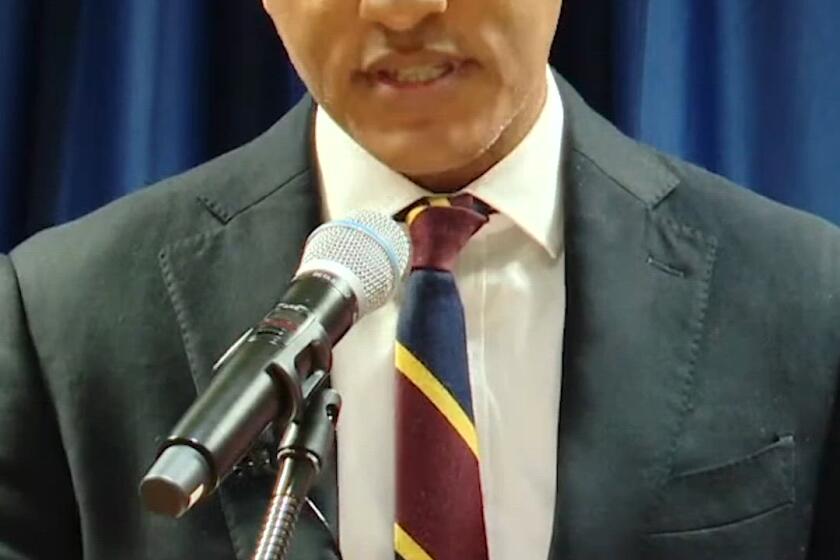Anglican leader: No ‘ultimatum’ on gay clergy
new orleans -- The archbishop of Canterbury indicated Friday that the Episcopal Church wasn’t on the brink of losing its place in the world Anglican fellowship, despite the uproar over Episcopal support for gay clergy.
Anglican leaders, called primates, had set a Sept. 30 deadline for the Americans to pledge unequivocally not to consecrate another gay bishop or approve an official prayer service for same-sex couples. Episcopal bishops have dedicated their meeting here to crafting a response.
But after two days of private talks with Episcopal leaders, Archbishop of Canterbury Rowan Williams, the Anglican spiritual leader, said “there is no ultimatum involved.” The goal, he said, is “compromise.”
“It’s been presented, sadly, as a set of demands,” Williams said in a news conference before he left. “I don’t think that what was in the primates’ minds. In fact, I’m sure it isn’t.”
The Episcopal Church is the Anglican body in the United States and has a more liberal view of Scripture than most Anglicans abroad. Tensions over Bible interpretation erupted in 2003 when Episcopalians consecrated the first openly gay bishop, V. Gene Robinson of New Hampshire.
Over the last four years, Anglican leaders have held emergency summits and private negotiations, trying to prevent differences over homosexuality from shattering the Anglican Communion.
The most recent international conference was held in February in Tanzania, where Anglican leaders called for the Americans to roll back their support for gays.
“This has consequences for the full participation of the church in the life of the communion,” the primates said in the document they approved then.
Williams acknowledged that “some primates would give a more robust interpretation of the demands, some less.” But the archbishop said the Sept. 30 date was chosen simply to coincide with the meeting of the Episcopal House of Bishops.
Bishop Stacy Sauls of Lexington, Ky., said that Williams and Australian Archbishop Phillip Aspinall, among the Anglican representatives who participated in the New Orleans meeting, said “we had misread the communique” and “expressed a sense of regret” over how it was written.
Still, there were moments of tension in the closed-door discussions. Bishops have said that Williams pressed them to make some concessions for the sake of Anglican unity.
As bishops took turns addressing Williams, Robinson said he found some of the archbishop’s comments on the decision before the church “dehumanizing” to gays and lesbians. In an interview Friday, Robinson said he had told Williams respectfully “what was on my mind and on my heart.”
“I have always held the archbishop of Canterbury in high regard and I will continue to do so,” Robinson said.
Egypt Bishop Mouneer Anis told the bishops that their decision to consecrate Robinson created “one of the most difficult disputes in the communion in our generation” and that some “think you are a different religion.”
“If you appreciate being members of the global Anglican family, then you have to walk alongside the members of your family,” Anis said, according to a circulated text of his remarks.
No one expects Episcopal leaders to completely reverse course. Theological conservatives are a minority in the denomination, and some wish to stay in the church.
Williams will work with Anglican leaders and with members of the Anglican Consultative Council, an international lay-clergy panel, in evaluating whatever statement Episcopal bishops make before they end their gathering Tuesday.
More to Read
Sign up for Essential California
The most important California stories and recommendations in your inbox every morning.
You may occasionally receive promotional content from the Los Angeles Times.










